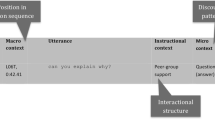Abstract
Recent empirical data available in Science Education literature show a relationship between the capacity to generate self-explanations of phenomena and/or problematic situations, (explanations offered by subjects from themselves, without incorporating new information coming from any external source), and self-learning (learning generated by subjects from themselves, without incorporating new information coming from any external source). The empirical data are related to a number of situations and contexts, and to different age groups (children, secondary students, and university students). To generate self-learning the usual means is a conversation. This conversation can be established either within him/herself, with a person, with a written text, with a problematic situation, with a computer. In this paper we will propose a theoretical framework to interpret this issue, and we will analyse practical cases to illustrate the validity of that model.
Access this chapter
Tax calculation will be finalised at checkout
Purchases are for personal use only
Preview
Unable to display preview. Download preview PDF.
Similar content being viewed by others
References
Bielaczyc, K., Pirolli, L. P., & Brown, A., L. (1995). Training in self-explanation and self-regulation strategies: investigating the effects of knowledge acquisition activities on problem solving. Cognition and Instruction, 13 (2), 221–252.
Bliss, J. & Ogborn, J. (1987). Knowledge elicitation. En: Ennals (ed), Artificial Intelligence, State of the Art Report, 15. Pergamon Infotech. Oxford.
Brown, A., L. (1992). Design experiments: Theoretical and methodological challenges in creating complex interventions in classroom settings. The J. of the Learning in Sciences, 2, 141–178.
Brown, A. L. , & Kane, M., J. (1988). Preschool children can learn to transfer: Learning to learn and learning from example. Cognitive Psychology, 20, 493–523.
Brown, A.L. & Palincsar, A.S. (1989). Guided, cooperative learning and individual knowledge acquisition. In: Resnick, L. B. (ed), Knowing, learning and instruction. LEA. Hillsdale, NJ, p 393–451.
Chi, M. T. H., Bassok, M., Lewis, M. T., Reimann, P. & Glaser, R. (1989). Self-explanations: How students study and use examples in learning to solve problems. Cognitive Science, 13 (2), 145–182.
Chi, M. T. H. & Bassok, M. (1989). Learning from examples via self-explanations. In: Resnick, L. B. (ed), Knowing, Learning and Instruction (pp. 251–282). LEA. Hillsdale, NJ.
Chi, T. H. M., Leeuw, N. de, Chiu, M. H. & Lavancher, C. (1994). Eliciting self-explanations improves understanding. Cognitive Science, 18, 439–477.
De Kleer, J. & Brown, J. S. (1983). Assumptions and ambiguities in mechanistic mental models. In: Gentner, D. & Stevens, A. L. (eds), Mental Models (pp. 155–190). LEA. Hillsdale, NJ.
Duschl, R. A. & Gitomer, D. H. (1997). Strategies and challenges to changing the focus of assessment and instruction in Science classrooms. Educational Assessment, 4 (1), 37–73.
Gutierrez, R. (1994). Coherencia del pensamiento espontáneo y causalidad. El caso de la dinámica elemental Doctoral dissertation. Univ. Complutense. Madrid. CD-ROM Edition: Servicio de Publicaciones. Univ. Complutense. Madrid, 2001.
Gutierrez, R. (1999). Aprendizaje autónomo. Un modelo Conversacional. In: Gutierrez, R. et al., Aspectos didácticos de la Fisicay Quimica (Fisica) (pp. 11–36). 8. ICE Univ. de Zaragoza. Zaragoza.
Gutierrez, R. (2001). Mental Models and the fine structure of Conceptual Change. In: R. Pinto and S. Surinach (eds), Physics Teacher Education Beyond 2000 (pp. 35–44). Elsevier Editions. Paris.
Gutierrez, R. & Ogborn, J. (1992). A causal framework for analysing alternative conceptions. Int. J. of Science Education, 14 (2), 201–220.
Gutierrez, R. & Ogborn, J. (1997). The process of Conceptual Change. Paper presented at ESERA First International Conference. Roma.
Gutierrez, R. & Pinto, R.,(1997). Mental models of physical systems: from description to explanation. In: Oblak, S., Hribar, M., Luchner, K. & Munih, M. (eds), New ways of teaching Physics (pp.381–384). Proceedings of the GIREP-ICPE International Conference . Board of Education of Slovenia. Lubliana (Slovenia).
Johnson, L. & Johnson, N., E., (1986). Knowledge elicitation involving teachback interviewing. In: Kidd, A. (ed), Knowledge elicitation for Expert Systems. Plenum. London.
Johnson, N. E. (1983). Elicitation and representation of children’s arithmetic knowledge. Doctoral dissertation. Chelsea College. University of London.
Johnson, N. E.,(1985). Varieties of representation in eliciting and representing knowledge for IKBS. International J. of System Res. and Information Science, 1, 69–90.
MacGregor, J. N. (1996), Incremental category learning without external information: An algorithm for category-opening internal learning (COIL). British Journal of Developmental Psychology, 87, 81–103f.
Pask, G. (1975). Conversation, Cognition and Learning. Elsevier. Amsterdam.
Pask, G. (1976a). Conversation Theory. Applications in Education and Epistemology. Elsevier. Amsterdam.
Pask, G. (1976b). Conversational techniques in the study and practice of education. British J. of Educational Psychology, 46, 12–25.
Perea, A., (1999). Razonamientos de estudiantes de Secundaria sobre los procesos de cambio. Doctoral dissertation. Univ. Autónoma de Barcelona.
Resnick, L. B., Salmon, M., Zeitz, M. C., Wathen, S. H. & Holowchak, M. (1993). Reasoning in Conversation. Cognition and Instruction, 11 (3–4), 347–364.
Serrano, T. (1992). Desarrollo conceptual del sistema nervioso en niños de 5 a 14 años. Modelos mentales. Doctoral dissertation. Univ. Complutense. Madrid.
Solsona, N. (1997). L’emergència de la interpretació delsfenòmens químics. Doctoral dissertation. Univ. Autónoma de Barcelona.
Shaw, M. L. (1979). Conversational heuristic for eliciting shared understanding. Int. J. Man-Machine Studies, 11, 621–634.
Author information
Authors and Affiliations
Editor information
Editors and Affiliations
Rights and permissions
Copyright information
© 2003 Springer Science+Business Media Dordrecht
About this chapter
Cite this chapter
Gutierrez, R. (2003). Conversation Theory and Self-Learning. In: Psillos, D., Kariotoglou, P., Tselfes, V., Hatzikraniotis, E., Fassoulopoulos, G., Kallery, M. (eds) Science Education Research in the Knowledge-Based Society. Springer, Dordrecht. https://doi.org/10.1007/978-94-017-0165-5_5
Download citation
DOI: https://doi.org/10.1007/978-94-017-0165-5_5
Publisher Name: Springer, Dordrecht
Print ISBN: 978-90-481-6337-3
Online ISBN: 978-94-017-0165-5
eBook Packages: Springer Book Archive




